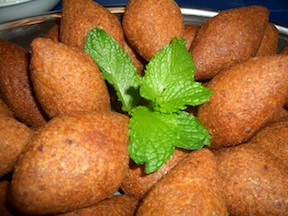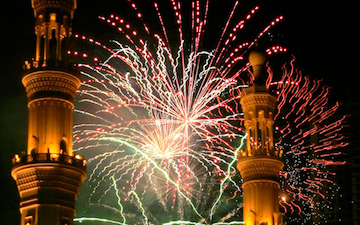The voices and stories of Syrian refugee experiences are not the only thing drowned out by the international news agencies' overwhelming focus on conflict, war, and death tolls. Underneath the tragedy, now literally buried beneath the rubble in many cases, is a cultural legacy that has spanned centuries and empires. The empires that ruled over and influenced Syria from the ancient to the modern period included the Mesopotamians, Egyptians, Persians, Greeks, Romans, and Byzantines, with the Ottoman empire ruling from 1516 to 1918. Religious, art, music, and food cultures are the legacy left behind that vary both according to cultural differences and regional differences, as well as a number of UNESCO World Heritage site designations for places of archeological importance across human history such as Damascus, Aleppo, Bostra, Palmyra, Krak des Chevaliers, and Qal'at Salāh al-Din.
 Dominant influences include Turkish, Greek, and southern Mediterranean, seen especially in foods such as hummus, falafel, sweet pastries, kebabs, and various dishes incorporating rice and lentils - the food culture is a mix of Arab, Kurdish, Druze, Armenian, Circassian, Assyrian, Alawite, Turkish, Turkmen, Palestinian, Ismaili, Greek, Jewish, and Yazidi influences. While there are other government and cultural institutions that aim to preserve and promote Arab culture in Syria, in the food there is a celebration of its inherited multiculturalism. From peppery dishes that call back to the influx of spices through trade along the Silk Road in Aleppo, to hearty dishes in Damascus, sea food along the coasts, and Bedouin influences in more desert regions near Jordan, no one thing becomes characteristic of Syrian food. That being said, kibbeh, a dish made of bulgar wheat filled with minced lamb can be found in almost every corner.
Dominant influences include Turkish, Greek, and southern Mediterranean, seen especially in foods such as hummus, falafel, sweet pastries, kebabs, and various dishes incorporating rice and lentils - the food culture is a mix of Arab, Kurdish, Druze, Armenian, Circassian, Assyrian, Alawite, Turkish, Turkmen, Palestinian, Ismaili, Greek, Jewish, and Yazidi influences. While there are other government and cultural institutions that aim to preserve and promote Arab culture in Syria, in the food there is a celebration of its inherited multiculturalism. From peppery dishes that call back to the influx of spices through trade along the Silk Road in Aleppo, to hearty dishes in Damascus, sea food along the coasts, and Bedouin influences in more desert regions near Jordan, no one thing becomes characteristic of Syrian food. That being said, kibbeh, a dish made of bulgar wheat filled with minced lamb can be found in almost every corner.
 In addition to festivals such as Eid al-Fitr, which marks the end of Ramadan, and Eid al-Adha, the feast of the sacrifice, which marks Ibrahim's (Abraham's) decision to sacrifice his first-born son to God, there are also events such as the Arabic Book Fair and the Silk Road Festival, which previously both held in September in Damascus. The first is newer and aims to celebrate and promote Arabic literature and both local and international authors. Though there is comparatively very little available in translation in English, the Arabic literary tradition reaches back to the medieval period and holds within it influences from Hellenic and Persian traditions, as well as from the Qu'ran. Contemporary Syrian authors of note include Samar Yazbek, Nizar Qabbani, Hanna Mina, and Salim Barakat. The Silk Road festival aims to take Damascus back to the years when it was a crossing point for Silk Road caravans, and to celebrate the diversity and unity encapsulated within the history of Syria. At the time of writing, it is unclear if these are both still held in the country; it seems as if both of these international events have found homes elsewhere in the Middle East with different iterations – Beirut for the former and Baku for the latter in recent years – due to the disruption and impact of the civil war.
In addition to festivals such as Eid al-Fitr, which marks the end of Ramadan, and Eid al-Adha, the feast of the sacrifice, which marks Ibrahim's (Abraham's) decision to sacrifice his first-born son to God, there are also events such as the Arabic Book Fair and the Silk Road Festival, which previously both held in September in Damascus. The first is newer and aims to celebrate and promote Arabic literature and both local and international authors. Though there is comparatively very little available in translation in English, the Arabic literary tradition reaches back to the medieval period and holds within it influences from Hellenic and Persian traditions, as well as from the Qu'ran. Contemporary Syrian authors of note include Samar Yazbek, Nizar Qabbani, Hanna Mina, and Salim Barakat. The Silk Road festival aims to take Damascus back to the years when it was a crossing point for Silk Road caravans, and to celebrate the diversity and unity encapsulated within the history of Syria. At the time of writing, it is unclear if these are both still held in the country; it seems as if both of these international events have found homes elsewhere in the Middle East with different iterations – Beirut for the former and Baku for the latter in recent years – due to the disruption and impact of the civil war.
 Damascus, the capital of Syria, was at one point the center of classical Arab music, and Aleppo is still known for muwashshah, a specific form of sung poetry with its roots in medieval Muslim Spain. But Syria's music is not limited to the past; contemporary musicians use hip-hop, rap, rock, trip-hop, jazz, indie folk music, and traditional music to speak out about what is happening in their country. Artists such as Lena Chamamyan, Yousef Kekhia and Bisher Hafez, Wasfi Massarani, Refugees of Rap, and Hello Psychaleppo have turned to music to tell refugee stories and to give voice to affirming life in the midst of the greater crisis.
Damascus, the capital of Syria, was at one point the center of classical Arab music, and Aleppo is still known for muwashshah, a specific form of sung poetry with its roots in medieval Muslim Spain. But Syria's music is not limited to the past; contemporary musicians use hip-hop, rap, rock, trip-hop, jazz, indie folk music, and traditional music to speak out about what is happening in their country. Artists such as Lena Chamamyan, Yousef Kekhia and Bisher Hafez, Wasfi Massarani, Refugees of Rap, and Hello Psychaleppo have turned to music to tell refugee stories and to give voice to affirming life in the midst of the greater crisis.
This is a very small and, perhaps, insufficient taste of a broad and rich culture, and admittedly it is hard to locate amidst the focus on the political history. However, maybe it will inspire others to search more for the place behind the politics, the home that these millions of refugees left behind, and the parts of their culture that they try to carry with them as they search for a new home.
On the topic of the conflict in Syria, the BBC offers many helpful resources explaining the situation such as this article and this video.
 At BookBrowse, we believe that books are not an end in themselves but a jumping off point to new avenues of thought and discovery. This is why, every time we review one we also explore a related topic. Such as this "beyond the book" article by Michelle Anya Anjirbag for A Land of Permanent Goodbyes by Atia Abawi.
At BookBrowse, we believe that books are not an end in themselves but a jumping off point to new avenues of thought and discovery. This is why, every time we review one we also explore a related topic. Such as this "beyond the book" article by Michelle Anya Anjirbag for A Land of Permanent Goodbyes by Atia Abawi.
Images:
Kibbeh
Eid al-Fitr celebration, courtesy of www.theodysseyonline.com
Refugees of Rap, courtesy of genius.com